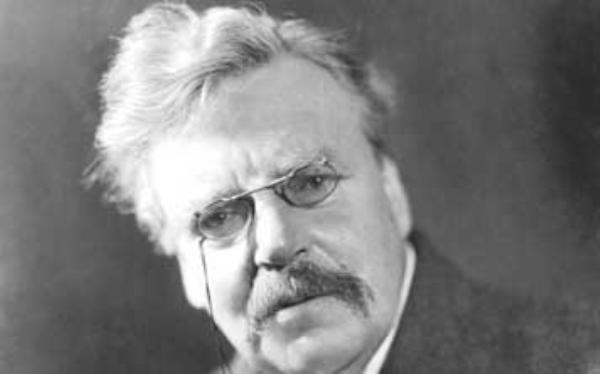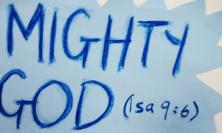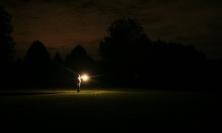Long before he became a Catholic in 1922, G.K. Chesterton was well known as a debater and defender of the possibility of Christian faith. Using paradox and comedy, he mixed journalism and philosophy, poetry and short stories, often with the hope of waking people up from their lazy assumptions about reality. Michael Paul Gallagher SJ offers an imaginary monologue in the voice of Chesterton that adapts his phrases and ideas, and tries to capture aspects of his vision which can help us revive our language of religious wonder for Advent.
You can be sitting quietly in a chair and suffer an attack of wonder, simply because you are alive. One moment everything seems boringly ordinary and the next it is suddenly and rapturously extraordinary. One moment you are sitting there with your daily but undramatic nihilism, where nothing seems very special, and the next a chink in your armour lets in a flood of novelty. You break out of the tiny theatre in which your own familiar plot is being played. This is the blessing of the sunrise of wonder. Indeed my main worry about people is that they might stay prisoners, stuck within all that seeming boredom. I wonder about their not wondering enough. You don’t have to be some special Alice to discover wonderland. You are in it all the time. It only needs ordinary imagination to see it.
So the first fruit of an attack of wonder is the birth of gratitude, even of humility. All the saints in their different ways lived a bottomless abyss of thanks. And then they made their lives into divine poetry, a poetry that opens to an infinite ocean. I exist, I am alive, what a shock, but more so, what a gift. I am given to myself. Life is given to me. Obviously I did not create myself. In the darkest time of my life, as a young art student, I plunged deeper and deeper into spiritual suicide by imagining that I had to construct my own life alone. I was tempted to think that there was nothing but thought. I lived with logical completeness and spiritual contraction, thinking that there was nothing but me and my thoughts. There was no foundation but me. And this terrifying flight from common sense led my young self, as it has led many before and since, to a nightmare of self without any God.
But let us not rush into God. God is used to waiting and it is good for us to wait too, to rest first in the awakening of wonder and its fruits. So here are some of my beatitudes. Blessed are those who expect little for they shall be gloriously surprised. Blessed are those stuck in the mists of pessimism, because they might receive a revelation of joy. Blessed are those who learn lightness of heart because they will find a waterfall of unmerited freedom. Blessed are those who get in touch again with childhood, because the world will become miraculous for them. The opposite of all these graces is a life that remains dry, pragmatic and negative. But fear not, we are made for a bigger story.
Yes, the attack of wonder is only the beginning of a huge adventure. The strangeness of romance hits you in the midst of the predictable daily world. When that surprise strikes you, you begin to see as if for the first time things that you have known all along, including yourself and your paths of possibility. You remember what you had forgotten. You realise there has to be more than this. You awaken to a refreshed future, to calls and promises, and not just for little you, but for this whole world.
With my fit of wonder I become more self-embracing with a kind of awe. Because like Hopkins: ‘What I do is me, for that I came’. That sense of uniqueness will open another door, to my non-aloneness and my finiteness. I was a painter and all my life I loved frames and limits, because it is here in the smallness that we learn to enjoy the hugeness. Happiness explodes not from anything in particular but from glimpsing everything in particular. Perhaps astonishment is our most ancient instinct. We are astonished at the world and yet at home in it and we need to choose to nourish the vision, to live from that glimpse of glory.
What starts as wonder or poetry gives birth to gratitude in quest for a giver, and that in turn carries us towards a love-story, a divine love-story. All the higher optimists travel this road. They fall in love with the universe and then look for a deeper source of it all. If there is a story, there must be a story-teller. And so they are propelled towards God as the origin and companion of their joy. Such a view of the universe is the most practical thing a person can have.
Of course we do terrible things to God. Woe unto those who keep a God like they keep a special hat: they don’t believe in God but only in A God. Unless God can be experienced as joy, lasting joy in spite of all shadows, our God is too small. The only credible God invades our imagination with amazement, not always intense but like a quiet background music of existence, an ultimate harmony that you can trust. You walk along the roads of your life thinking that you might meet God at any turn of the path. God’s radiance is not just around the corner but in everything now. You need to ask for a certain receptiveness to see like a child again. Indeed romance is deeper than so-called reality.
All of this is ordinary ecstasy. Not something special in a sense that only a privileged few belong to the club. This club is existence. It belongs to all of us. The ordinary is splendid when you wake up from your dullness and discover a mysticism that has kept us sane from the beginning of the world. But it is not just a gift for you alone. We are here to make a difference. We need simply faith, hope and love to rescue us. And thank God they are not our doing. They release us from our doings into the doings of God. They flourish where human resources fail, as in earthquake or eclipse. Faith is faith because it is able to survive our moods. With such a gift we need not run from the cry of history around us, but see that pained world as worth transforming, with God’s help and for God’s glory.
Of course the explosive reality at the core of Christianity is that God did not leave us alone to face this call. You need not rely on an inner light when there is such an outer light. The coming of Christ, when you let it in, continues to shock us, as indeed it should. The Logos of the universe enters the human stage through an ordinary birth. And this is a drama, a story such as no poet imagined, a truth such as no philosopher conceived. It tells the greatest romance of love. This Child came to change the world from the inside. The Three Magi were right to go home by a different way, when they realised that this child burst open the narrowness of all their philosophy and all their desiring. And at the end there is only one religion in which God seemed for an instant to be an atheist. But even here the Roman centurion also went home surely with a different vision: he had seen someone dying who took him beyond all his imagining. And then two days later the disciples glimpsed another wonder, whereby the world had died during the night and joy had come to stay. Why has this story illumined millions of lives? Because this is not a God of colourless, cosmic control but a God of Love. And this fits the lock of our human hearts and questions. Faced with Risen Love our responses unite childlike simplicity and never-ending complexity, the wonder of silence and the wonder of many words trying to do justice and make sense. And for me the Church is the great attempt in history to change the world from the inside, through awakening desire and will and ultimately love.
In short my life has been a mystery-story, blessed with gratitude in spite of sorrow and with joy in spite of sin. Existence has remained such a strangeness opening me to the only One who can work such a miracle. So I have tried to live a simple religion of gratitude, but this gratitude needed a theology to ground it. It needed a tradition to go beyond a vague sense of purpose and presence. And so I found my own mystical, imaginative hunches confirmed in Christianity and Catholicism. The Church dared to go down with me into the depths of myself, healing my self-hurts with absolution and restoring me to joy, a joy that stays in touch with reality and with responsibility. Here in Christ is God’s answer to the riddle of the universe, the perfect fit for the human heart, swinging as it does like a pendulum between guilt and glory.
‘The less a man thinks of himself, the more he thinks of his good luck and of all the gifts of God.’[1] I am a large man, but thank God I have felt happily too small for life, for the life that wells up into eternity. ‘I have experienced the mere excitement of existence in places that would commonly be called as dull as ditchwater. And, by the way, is ditchwater dull? Naturalists with microscopes have told me that it teems with quiet fun.’[2]
Michael Paul Gallagher SJ is Professor of Fundamental Theology at the Gregorian University in Rome.
[1] G.K. Chesterton, St Francis of Assisi
[2] Quoted in Maisie Ward, Gilbert Keith Chesterton
![]() ‘The Battleground of Imagination’ by Michael Paul Gallagher SJ
‘The Battleground of Imagination’ by Michael Paul Gallagher SJ
![]() Alison Milbank reviews Chesterton and the Romance of Orthodoxy on Thinking Faith
Alison Milbank reviews Chesterton and the Romance of Orthodoxy on Thinking Faith






